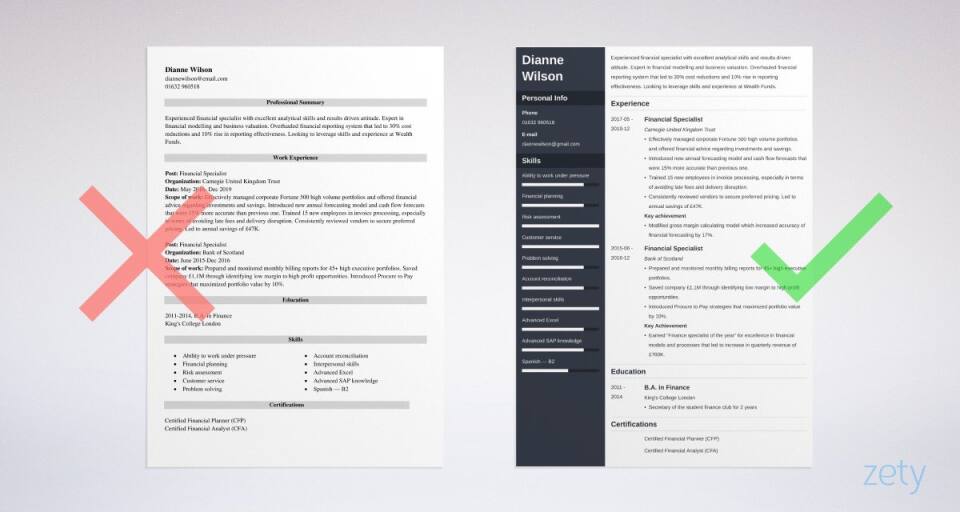Finance CV Examples & Template for 2026
Create your CV nowA strong finance CV is essential to stand out in a competitive job market where employers look for proven skills in analysis, planning, and risk management. I'll share with you expert advice on choosing the right structure, highlighting measurable achievements, and tailoring your application to specific roles. With step-by-step tips, a ready-to-use finance CV template, and multiple finance CV examples, you’ll have everything you need to showcase your expertise clearly and professionally – and increase your chances of landing interviews. Let's begin!
In this guide:
- A finance CV example better than 9 out of 10 other CVs.
- How to write a finance CV that will land you more interviews.
- Tips and examples of how to put skills and achievements on a finance CV.
- How to describe your experience on a finance CV to get any job you want.
Want to save time and have your CV ready in 5 minutes? Try our CV builder. It’s fast and easy to use. Plus, you’ll get ready-made content to add with one click. See 18 CV templates and create your CV here.
Finance CV made with our builder—See more CV examples here.
Finance CV template
Dianne Wilson
Financial Specialist
diannewilson@email.com
01632 960518
Professional Summary
Experienced financial specialist with excellent analytical skills and results driven attitude. Expert in financial modelling and business valuation. Overhauled financial reporting system that led to 30% cost reductions and 10% rise in reporting effectiveness. Looking to leverage skills and experience at Wealth Funds.
Work Experience
Financial Specialist
Carnegie United Kingdom Trust
May 2016- Dec 2019
- Effectively managed corporate Fortune 500 high volume portfolios and offered financial advice regarding investments and savings.
- Introduced new annual forecasting model and cash flow forecasts that were 15% more accurate than previous one.
- Trained 15 new employees in invoice processing, especially in terms of avoiding late fees and delivery disruption.
- Consistently reviewed vendors to secure preferred pricing. Led to annual savings of £47K.
Key achievement
- Modified gross margin calculating model which increased accuracy of financial forecasting by 17%.
Financial Specialist
Bank of Scotland
June 2015-Dec 2016
- Prepared and monitored monthly billing reports for 45+ high executive portfolios.
- Saved company £1,1M through identifying low margin to high profit opportunities.
- Introduced Procure to Pay strategies that maximized portfolio value by 10%.
Key Achievement
- Earned “Finance specialist of the year” for excellence in financial models and processes that led to increase in quarterly revenue of £700K.
Education
2011-2014, B.A. in Finance
King's College London
- Secretary of the student finance club for 2 years
Skills
- Ability to work under pressure
- Financial planning
- Risk assessment
- Customer service
- Problem solving
- Account reconciliation
- Interpersonal skills
- Advanced Excel
- Advanced SAP knowledge
- Spanish — B2
Certifications
- Certified Financial Planner (CFP)
- Certified Financial Analyst (CFA)
This is how to write a job-winning finance CV:
1. Use the best format for your finance CV template
People in finance work for banks or other financial institutions to service and counsel individual and corporate clients in their financial needs. The purpose of your finance CV is to show that you have both the skills and experience needed to reach an organisation’s financial goals.
Finance is an umbrella term that covers a wide array of different specialisations. Finance employees work in positions from analysts and specialists to managers and directors, each with their own necessary set of skills and expertise.
The not-so-good news is that competition is fierce, and recruiters don’t have hours to get to know you. In fact, they spend only a few seconds initially scanning a CV. To get the recruiter to invest more time in your CV, you need to follow these CV formatting rules:
- Check that your CV contact information is up to date. Double-check your social media footprint for anything that might be seen as unprofessional or unethical.
- Optimising your LinkedIn profile is a must. Leverage it as a chance to share more information about your professional experience and interests in finance.
- Out of all CV styles, the chronological layout is the go-to for finance CVs. It highlights your professional job experience and financial skills, which is exactly what you want to underline. An added bonus is that it’s also the format that most recruiters recognise and is quite ATS-compliant.
- For a clean CV template, choose a CV font that’s professional and easy to read. You know that people rarely read the fine print, so make sure to use a good font size and leave some white space for better visibility.
- If you want your CV layout to look like one of your professionally formatted spreadsheets, save it in a PDF format.
There are a lot of questions about how long your CV should be. A good rule of thumb is that a one-page CV template should do the trick, unless you’ve been in finance as long as the U.S dollar.
Read more: Best CV Structure
2. Write a summary or objective for a finance CV
Make your introduction through your CV profile, or to be precise, a career objective or summary. It’s a short and sweet paragraph that begins your finance CV and helps recruiters quickly understand that you’re the shiny penny they want.
If you’ve been balancing the books for more than 2 years, write a career summary:
- Think about the key points in your experience and financial skills, and make notes. Remember about your career accomplishments—they can really wow recruiters.
- Choose four great points and add them to your finance CV summary section to show the recruiter that they can bet their bottom dollar on you.
If you’re writing an entry-level CV or a finance intern CV, choose the career objective:
- Highlight skills and knowledge you’ve gathered to date, and include some points on how good of a fit you’d be for the company.
- Think of relevant transferable skills and quantifiable achievements from other gigs you’ve had throughout your life and school, especially if they can prove certain skills or know-how.
About 3-4 sentences long max is all you really need here. Don’t forget to tailor it to the job description, just like you tailor financial forecasts to the current economic weather.
3. Create the perfect finance CV job description
If you want to land that interview you’re dreaming of, your CV experience section needs to be more appealing than a no-risk, high-return investment:
- Start from your current position and then go back in time.
- Make each entry clear and concise by adding: job titles, company name, dates of employment, and 6 bullet points max that mention your accomplishments.
- Lower the number of bullet points for your earlier jobs. Positions in the past shouldn’t have more than three bullet points.
- Use an action verb at the beginning of each bullet point.
- Creating a laundry list of duties isn’t the way to go. Instead, use quantifiable achievements to impress. Make the numbers work for you.
- Tailor your finance experience section to the position you want to increase your chances of getting that interview.
4. Make your finance CV education section shine
Education is important in finance, so you can’t just skim over this part.
Here’s how to get your education section to make recruiters go all in:
- Don’t get into too much detail if you have more than a few years of experience. Just list the following: college/university name and location, years you studied, degree, major and minors.
- If you only have a year or two of experience or you’re writing a recent college grad CV, beef up your education CV section with wins from your college days (such as a GPA or Latin honours). Make sure they’re relevant and list no more than 4-6 items.
If you’re as new as a crisp bill or writing a finance internship CV, put your education section above your work experience. You’ll be focusing on your strengths, which is the best way to start your CV with no experience.
5. Highlight your financial skills
Skills are the cornerstone of any occupation, and that’s especially true for finance, where analytical skills are just as crucial as people skills.
Here’s how to list your financial skills that’ll give recruiters visions of a high ROI:
- Think about the job skills you have—this means soft skills and hard skills, technical skills, and any other relevant skills you’ve got in your portfolio. List them.
- Pick the most relevant financial skills by using the job ad as a cheat sheet. Include those top skills in your financial CV. Always mention skills that both your experience and education sections prove.
CV Skills List for Finance Professionals
- Interpersonal skills
- Accounts receivable and payable
- Due diligence
- Cash handling
- Debt and credit management
- Problem-solving skills
- Time management skills
- Negotiating
- Communication skills
- Computer skills
- Financial analysis
- Collaboration skills
- Risk assessment
- Account reconciliation
- SAP
- Microsoft Office skills
- Conceptual skills
When making a CV in our builder, drag & drop bullet points, skills, and auto-fill the boring stuff. Spell check? Check. Start building your CV here.
When you’re done, Zety’s CV builder will score your CV and tell you exactly how to make it better.
6. Add extra sections to your finance CV
You’ve done a lot, but you’re not done just yet. You still have some room to really drive home the bottom line—you’re the employee they need.
- Add language skills that can be beneficial to your job. The future of finance will be in emerging markets, so your knowledge of their languages will give you an advantage over the competition.
- Include volunteering, achievements and awards, projects, and even hobbies and interests if they’re relevant to finance or prove a certain skill or know-how. Finance workers need to have a wide array of skills to be excellent and flexible at their job, so include things that can prove that.
- Don’t forget about your certifications! These are absolutely crucial if you’re striving to become a finance director, financial analyst, finance manager, finance specialist, or any other kind of finance specialist.
Read more: What to Put on a CV
7. Attach a cover letter to your finance CV
You should include a cover letter, even if the job ad doesn’t ask for one. Recruiters read them, and it gives you more room to prove that you’re a sound investment.
Write a finance cover letter that will have the U.S Treasury minting coins with your face on them:
- Use a modern cover letter format that shows you’re a professional ready to get down to business.
- Start your cover letter off with a “hook” to grab the hiring manager’s attention.
- Show that your experience and job skills are the returns the company is looking for with specific examples.
- Add an impactful call to action to end your cover letter.
The ideal length of an effective cover letter is around one page, so keep it concise and to the point.
Plus, a great cover letter that matches your CV will give you an advantage over other candidates. You can write it in our cover letter builder here. Here's what it may look like:
See more cover letter templates and start writing.
Later on, remember to follow up on your job application! There’s no point in managing a portfolio if you’re not going to track its progress! That’s the nuts and bolts behind a successful finance CV.
Thank you for reading my article on writing the perfect financial CV. If you need more expert advice on career development and more, feel free to explore other pieces on our blog!
About Zety’s Editorial Process
Our editorial team has thoroughly reviewed this article to ensure it follows Zety’s editorial guidelines. Our dedication lies in sharing our expertise and providing you with actionable career advice that offers you real value. Every year, the quality of our content attracts 40 million readers to our site. But that’s not all – we conduct original research to gain a detailed understanding of the labour market. We take pride in being cited by top universities and leading media outlets in the UK and worldwide.
Sources
- Deloitte Insights, "2025 banking and capital markets outlook"
- Harvard Business School, "6 negotiation skills all professionals can benefit from"
- The Ladders, "Eye-Tracking Study"






![Accountant CV: Template, Examples + Writing Guide [2026]](https://cdn-images.zety.com/pages/accountant_cv_example_zety_uk_1.jpg?fit=crop&h=250&dpr=2)